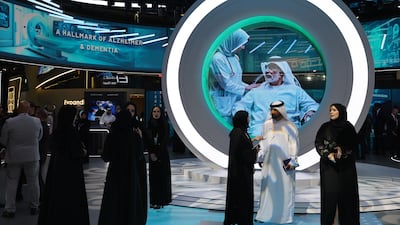In the 50 years since the first Arab Health conference was held in Dubai, much has changed in the UAE and around the world.
For one, the global population has more than doubled – from 4 billion to 8.2 billion. And our understanding of chronic conditions, diagnoses, treatments – and even the diseases and pandemics we've seen since – has broadened. Perhaps one of the biggest changes, however, has been in the field of cutting-edge technology. It has touched all aspects of health, from the digitalisation of health care to the rate at which AI has been adopted by the medical sector for diagnosis and treatment.
Back in 1975, the concept of "wearable tech" didn't exist and physicians were not routinely and successfully being assisted by artificial intelligence, as is sometimes the case, including by providers in the UAE.
What is unchanged though is that most people even now, like they were five decades ago, are invested in good health and living a pain-free life.
Arab Health, the Middle East’s largest and most influential healthcare event that is taking place this week in Dubai, is where some of the biggest medical trailblazers and specialists in healthcare innovations gather to learn about new technologies that could ultimately aid quality of life.
The varied medical devices and advancements exhibited at the event point to a sizable interest in preventive care, early diagnosis and treatment so that people can mange illnesses, stay out of hospitals and have a good quality of life. This, in turn reduces the burden on healthcare systems, which is a concern for all countries.
Drawing the kind of audience Arab Health does, the event has pride of place in the Emirates' and Arab world's healthcare calendar, with more than 200 UAE companies displaying their products this year. But Arab Health is a platform for the latest health innovations not just in the region but increasingly around the world. By 2030, the global consumer healthcare market is said to be worth $780 billion. Last year alone, the event added just under $270 million to Dubai's economy and business deals worth $2.4 billion were conducted.
But while this is an exciting time for the healthcare industry and such significant investments are promising for the future of treatments, the sector is confronted with enormous challenges.
A growing population globally – also an ageing one, which requires near-constant care – necessitates the need for more specialised care, more investment and a wider global infrastructure to cope with medical demands. There is also a rising demand for exceptionally high-quality health care and increasingly, for customised medical solutions in longevity and wellness.
One example of this is a device at Arab Health called the Longevity Capsule that delivers red-light therapy, salt therapy, oxygen and which is used for varied skin conditions. The $60,000 innovation reportedly helps muscle recovery and improves physical performance.
This perhaps illustrates that technologies will have to advance at a much more rapid pace to keep up with the growing and evolving demands of patients looking for newer, targeted solutions for lifestyle-related concerns, not just medical ones.
While AI can help reduce some of the costs and be invaluable in completing hospital administrative tasks to free up medical professionals so that they can focus on treating a patient, there is a need for other, broader solutions for a wide range of ailments. Industry gatherings such as Arab Health are where these nascent solutions begin to gain visibility and traction among healthcare leaders and providers, in addition to sharing best practice. They, too, know well that anywhere in the world, health is usually the number one concern of people.

